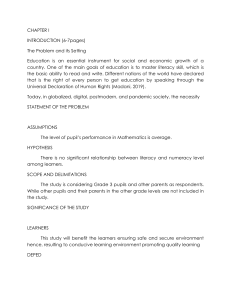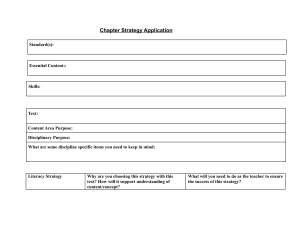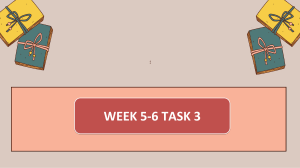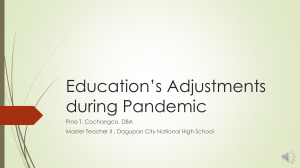The 21st Century Skills of Learners in the World by Marlon Fortes Monedo
advertisement
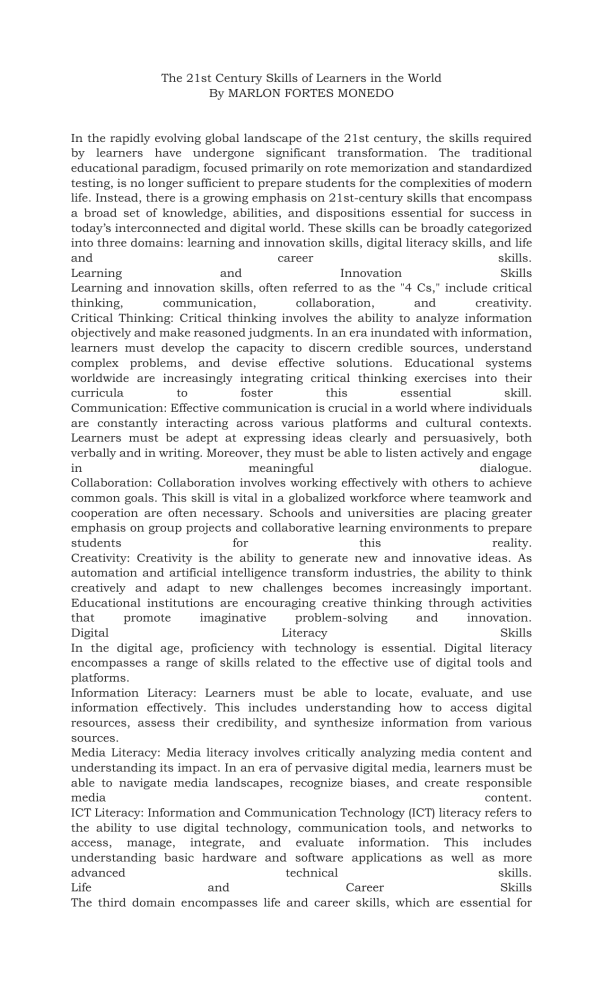
The 21st Century Skills of Learners in the World By MARLON FORTES MONEDO In the rapidly evolving global landscape of the 21st century, the skills required by learners have undergone significant transformation. The traditional educational paradigm, focused primarily on rote memorization and standardized testing, is no longer sufficient to prepare students for the complexities of modern life. Instead, there is a growing emphasis on 21st-century skills that encompass a broad set of knowledge, abilities, and dispositions essential for success in today’s interconnected and digital world. These skills can be broadly categorized into three domains: learning and innovation skills, digital literacy skills, and life and career skills. Learning and Innovation Skills Learning and innovation skills, often referred to as the "4 Cs," include critical thinking, communication, collaboration, and creativity. Critical Thinking: Critical thinking involves the ability to analyze information objectively and make reasoned judgments. In an era inundated with information, learners must develop the capacity to discern credible sources, understand complex problems, and devise effective solutions. Educational systems worldwide are increasingly integrating critical thinking exercises into their curricula to foster this essential skill. Communication: Effective communication is crucial in a world where individuals are constantly interacting across various platforms and cultural contexts. Learners must be adept at expressing ideas clearly and persuasively, both verbally and in writing. Moreover, they must be able to listen actively and engage in meaningful dialogue. Collaboration: Collaboration involves working effectively with others to achieve common goals. This skill is vital in a globalized workforce where teamwork and cooperation are often necessary. Schools and universities are placing greater emphasis on group projects and collaborative learning environments to prepare students for this reality. Creativity: Creativity is the ability to generate new and innovative ideas. As automation and artificial intelligence transform industries, the ability to think creatively and adapt to new challenges becomes increasingly important. Educational institutions are encouraging creative thinking through activities that promote imaginative problem-solving and innovation. Digital Literacy Skills In the digital age, proficiency with technology is essential. Digital literacy encompasses a range of skills related to the effective use of digital tools and platforms. Information Literacy: Learners must be able to locate, evaluate, and use information effectively. This includes understanding how to access digital resources, assess their credibility, and synthesize information from various sources. Media Literacy: Media literacy involves critically analyzing media content and understanding its impact. In an era of pervasive digital media, learners must be able to navigate media landscapes, recognize biases, and create responsible media content. ICT Literacy: Information and Communication Technology (ICT) literacy refers to the ability to use digital technology, communication tools, and networks to access, manage, integrate, and evaluate information. This includes understanding basic hardware and software applications as well as more advanced technical skills. Life and Career Skills The third domain encompasses life and career skills, which are essential for personal and professional success in the 21st century. Flexibility and Adaptability: The ability to adapt to change and remain flexible in the face of new challenges is crucial. The modern world is characterized by rapid technological advancements and shifting job markets, requiring individuals to continuously learn and adapt. Initiative and Self-Direction: Learners must be proactive and self-motivated, capable of setting goals, managing time effectively, and working independently. These skills are critical for success in both academic and professional settings. Social and Cross-Cultural Skills: As the world becomes increasingly interconnected, the ability to work effectively with diverse groups of people is essential. This includes understanding and respecting cultural differences, communicating across cultural boundaries, and collaborating with people from various backgrounds. Productivity and Accountability: Being productive and accountable involves managing projects efficiently, meeting deadlines, and taking responsibility for one’s work. These skills are necessary for achieving success in any career path. The 21st-century skills framework underscores the importance of a holistic approach to education that prepares learners not just for academic success, but for life in a complex, digital, and interconnected world. By emphasizing learning and innovation skills, digital literacy, and life and career skills, educators can equip students with the tools they need to thrive in the future. As the global landscape continues to evolve, so too must our approaches to teaching and learning, ensuring that all learners are prepared to meet the challenges and opportunities of the 21st century.
